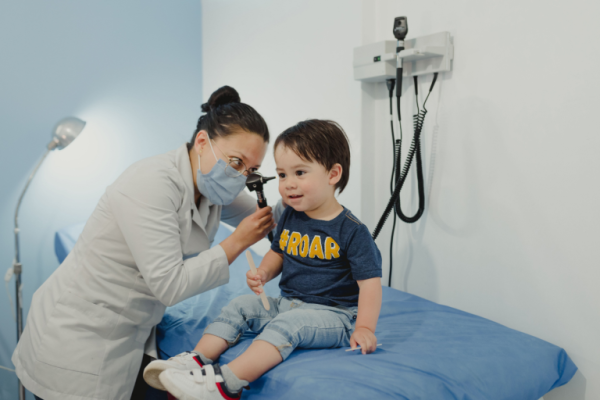
Home » Nursing Careers » Pediatric Nurse Practitioner
Pediatric Nurse Practitioner (PNP)
- Updated February 19, 2023
- by EveryNurse Staff

What Is a Pediatric Nurse Practitioner?
Frequently Asked Questions About PNPs
- What is the difference between a doctor and a nurse practitioner?
- What is the highest-paid nurse practitioner specialty?
- What nurse practitioner specialties are in the highest demand?
- What is the scope of a nurse practitioner’s practice?
- How does the growing number of nurse practitioners affect hospitals?
- What are three tips to overcome challenges as a new nurse practitioner?
What Does a Pediatric Nurse Practitioner Do?
As advanced practice registered nurses, PNPs can perform many of the same functions as a physician. PNPs provide a full scope of care to patients, including diagnosing and treating illnesses, ordering and interpreting lab tests and imaging studies, prescribing medications, and counseling patients on health and wellness. In addition, PNPs may also be involved in conducting research, teaching, and advocacy work.
In some settings, PNPs may be the only health care providers who are seeing pediatric patients. This means that they may perform a wide variety of different duties, from writing prescriptions and performing physical exams to counseling patients and families. PNPs also play a key role in the development of medical policies, quality improvement initiatives, and patient safety standards.
Pediatric Nurse Practitioner Job Description
The daily responsibilities of a pediatric nurse practitioner depend on the practice setting, but they typically include the following tasks:
- Assessing the health status of children and adolescents
- Evaluating and diagnosing common illnesses and injuries in children such as respiratory infections, ear infections, and fractures
- Developing treatment plans and prescribing medications
- Counseling patients and their families on topics such as nutrition, emotional health, and safety
- Educating parents, teachers, and school administrators about health issues
- Managing chronic conditions (including mental health concerns) such as asthma, diabetes, and obesity
- Performing screenings for developmental delays
- Developing wellness plans to promote healthy lifestyles
- Identifying community resources that support the well-being of children and adolescents
- Administering immunizations according to the recommended schedule
Important Facts About Pediatric Nurse Practitioners
- The pediatric population is defined as individuals aged 21 or younger at the time of their diagnosis or treatment.
- The primary clinical focus areas for PNPs are Primary Care, Acute Care, and Primary Care Mental Health.
- The most common practice settings for PNPs are private group practices, hospital outpatient clinics, and hospital inpatient units.
- According to a survey by the AANP, a Psychiatric Mental Health Nurse Practitioner (PMHNP) is the highest-paid NP specialty, with a total income of $128,000, which includes base salary, productivity bonuses, and incentive payments.
- As an advanced practice registered nurse, PNPs hold either a Master of Science in Nursing (MSN) or Doctor of Nursing Practice (DNP) from a pediatric nurse practitioner program.
Related APRN Careers
PNP Certification Options
Acute Care Certified Pediatric Nurse Practitioner – CPNP-AC
Primary Care Certified Pediatric Nurse Practitioner – CPNP-PC
Primary Care Certified Pediatric Nurse Practitioner – CPNP-PC
Pediatric Nurse Practitioner Salary
| NP CERTIFICATION | HOURLY RATE * | ANNUAL BASE SALARY * | TOTAL INCOME * |
|---|---|---|---|
| Pediatrics – Primary Care | $61.50 | $108,500 | $115,000 |
| Pediatrics – Acute Care | $64.00 | $112,000 | $115,000 |
| Pediatrics – Primary Care Mental Health | $68.45 | $124,000 | $128,000 |
| * American Association of Nurse Practitioners, National Nurse Practitioner Sample Survey, 2019 | |||
Additional Resources for PNPs
- National Association of Pediatric Nurse Practitioners
- Institute of Pediatric Nursing
- Society of Pediatric Nurses (SPN)
- Association of Pediatric Hematology/Oncology Nurses
- National Association of School Nurses
- American Pediatric Surgical Nurses Association (APSNA)
- Association of Faculties of Pediatric Nurse Practitioners (AFPNP)
- Society of Pediatric Cardiovascular Nurses
Pediatric Nurse Practitioner FAQ
A pediatric nurse is a registered Nurse (RN) who has completed an associate degree or bachelor’s degree in nursing, along with additional clinical training in pediatrics. A PNP is a nurse practitioner who has completed a master’s or doctoral program in nursing focusing on pediatrics. Both RNs and NPs are able to provide high-quality care for children, but NPs have additional training and experience in managing complex medical conditions and providing primary care.
Over the course of their education, PNPs receive extensive training in childhood growth and development, diagnosing and treating illnesses in children, as well as providing preventive care. This makes PNPs uniquely qualified to provide comprehensive care for children from birth through adolescence.















